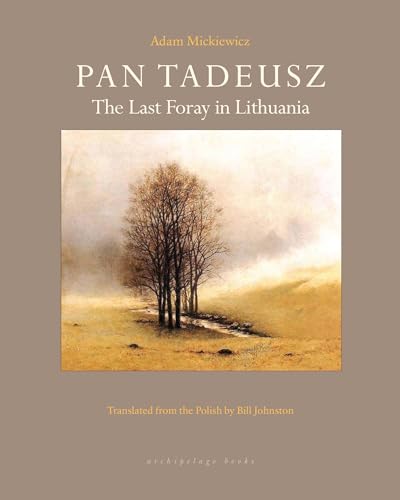Pan Tadeusz
The Last Foray in Lithuania
Adam Mickiewicz
BOOK REVIEW

Pan Tadeusz: The Last Foray in Lithuania is not merely a literary work; it is a resounding echo of a bygone era infused with the romantic spirit of nationalism, a captivating tapestry woven by Adam Mickiewicz, Poland's national bard. Every page flutters like the wings of a majestic eagle, beckoning you to soar through its narrative, immersing yourself in the poignant struggles of a country teetering on the edge of oblivion. 📜
Set in the backdrop of 19th-century Lithuania, the stage is meticulously crafted for a drama that transcends the mere personal to the national. The characters, drawn from the lives of noble families, become symbols, embodying the collective longing for homeland and identity. As you delve into the lives of Tadeusz and Zosia, you are invited into a world where the mundane ignites the extraordinary. Every tea party, every duel romanticizes a reality filled with hearts yearning for freedom-a microcosm of the Polish spirit pulsating through every interaction.
Mickiewicz's lyrical prose is enchanting, each word dripping with emotion, bringing to life the lush landscapes and intricate customs of the Lithuanian gentry. His vivid depictions are not just delightful to read; they transport you to the verdant meadows and whispering forests, making you feel the air thick with the scent of history. You can almost hear the rustle of leaves as the characters tread the same paths that once cradled a nation's hopes. 🌳
Critics have remarked that Pan Tadeusz holds a mirror to the complexities of Polish identity, caught in the tumult of partition and rebellion. Yet, to dismiss it as merely a nationalistic text would be to overlook its universal themes of love, duty, and the relentless pursuit of freedom. As much as it is a tale of personal rapprochement, it is also a rallying cry for resilience-a poignant reminder of the never-ending quest for autonomy and belonging. Several readers have shared their emotional responses, noting how the book stirred a profound connection to their heritage and the zeitgeist of a people perpetually in search of their narrative. 💔
But amidst the rapture of its beauty, there comes a stark reality-the specter of loss. Some readers critique the romanticization of the Polish gentry's lives, arguing it glosses over the harshness of peasant struggles and historical injustices. This dichotomy raises questions about perspective, challenging you to reflect on the narratives that shape our understanding of history. Engaging with Pan Tadeusz becomes an exercise not just in reading but in grappling with the multifaceted nature of identity and culture.
Mickiewicz, who himself was intertwined with the very fabric of Polish nationalism, crafted this epic poem as a legacy. It's a celebration of unity and a condemnation of division, an embodiment of a spirit that refuses to be extinguished, even when faced with dire circumstances. As you turn each page, the stakes feel palpable; you find yourself rooting for Tadeusz not just as a character, but as a symbol of hope for a nation in exile.
In the grand theater of literature, Pan Tadeusz stands tall, casting a long shadow over works that wish to capture the essence of a society in dissent. It calls you to witness not just the life of individuals but the birth of a collective conscience, urging you to remember that stories have power-the power to connect, to heal, and to inspire revolution. Don't let this masterpiece slip through your fingers; let it awaken the fire of curiosity and solidarity within you.🔥
📖 Pan Tadeusz: The Last Foray in Lithuania
✍ by Adam Mickiewicz
🧾 496 pages
2018
#tadeusz #last #foray #lithuania #adam #mickiewicz #AdamMickiewicz